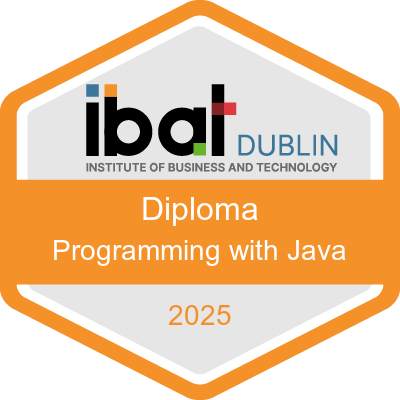- Why Computer Programming?
- Course Overview
- Career Opportunities
- Entry Requirements
Who should take this course?
This course is ideal for:
- Beginners who want to start their programming journey with a versatile language like Java.
- Programmers from other languages who want Java developer training.
- Students and professionals looking to explore software development and application building.
- Those interested in Android app development, as Java is a primary language for Android applications.
What will I experience?
- Hands-on coding: You will engage in practical, hands-on coding exercises, allowing you to apply the concepts you learn in real Java programs.
- Interactive learning: Participate in a collaborative and interactive learning environment where you can ask questions, seek help, and discuss with your instructor and peers.
- Project work: Complete a Java project demonstrating your understanding of Java programming concepts.
- Access to resources: Gain access to a wide range of resources, including code examples, documentation, and tools, to support your learning journey.
- Practical problem solving: Develop problem-solving skills by tackling real-world programming challenges, allowing you to apply your Java knowledge to practical situations.
What will I learn?
By the end of this programming course, you will be able to:
- Understand Java fundamentals: Understand the core Java concepts, syntax, and data types.
- Write and debug Java Code: Learn how to write and debug Java programmes using popular Integrated Development Environments (IDEs).
- Object-oriented programming: Comprehend the principles of object-oriented programming (OOP) and how they apply to Java.
- Control flow: Master control flow structures, such as loops and conditionals, to create efficient and flexible programmes.
- Collections and data structures: Explore the Java Collections Framework and work with arrays and lists
- Exception handling: Learn to handle exceptions and errors gracefully in your Java code.
- File I/O: Understand how to read from and write to files in Java.
- Introduction to GUI programming: Get an overview of Graphical User Interface (GUI) programming using Java Swing.
- Basic Application development: Create basic Java applications, which can be command-line, desktop, or mobile-based, depending on your interests.
- Best practices: Discover industry best practices and coding conventions to write clean and maintainable Java code.
Ireland is home to the majority of the world’s most well-known software companies. Over 900 software companies employ 24,000 people in Ireland, including both multinational and local firms.
The government’s main goal, according to Ireland’s Third ICT Skills Action Plan Report, is to raise the number of graduates with high-level ICT skills by more than 6,000 every year by 2024.
Course Overview
This course is designed to provide students with a comprehensive introduction to Java, one of the world’s most popular and versatile programming languages. Java is known for its platform independence, making it a critical language in web, mobile, and desktop application development. Whether you’re a beginner looking to kickstart your programming journey or an experienced developer seeking to add Java to your skillset, this course will equip you with the foundational knowledge and skills needed to write Java applications.
Course Outline:
Week 1
Introduction to Java Programming: In this class, you will learn to use the Java Development kit to create Java programs that print text to the screen, obtain input from the user, perform calculations, and print results on the computer screen. (You will be instructed to prepare your computer for Java programming before the course begins.)
Week 2;
Introduction to Classes and Objects: You will be introduced to OOP (Object Oriented Programming). You will learn to create Java programs using multiple files and simulate real-world objects.
Week 3 and Week 4
Java Control Structures: You will learn fundamental problem-solving techniques and the basic programming structures that allow your program to make decisions (if/if..else statements) and repeat code (repetition structures).
Week 5
Methods A Deeper Look – You will learn to create a class (static) and object methods and understand the mechanism for passing information between processes. You will learn to overload methods and manage the scope and lifetime of methods and objects.
Week 6
The Collections Framework Arrays and Array Lists: You will learn how to use data structures to store and process efficiently a large amount of data in memory.
Week 7
Classes and Objects a Deeper Look: In this class, we will explore object-oriented programming concepts, such as data hiding and encapsulation, and learn how to create abstract data types. You will learn how to organise classes as packages that promote software reuse. We will also cover software reuse using composition.
Week 8
Object Oriented Programming Inheritance and Polymorphism. You will learn how to effectively reuse existing classes to create new classes and promote efficient software development.
Week 9
Exception Handling: You will learn to use the Java exception (error) handling mechanism to create robust software by handling exceptions (errors). At the same time, the program runs, allowing your program to recover from the problem and continue.
Week 10
File I/0 (file input/output): In this class, you will learn how to create, read and update text and binary files. You will learn how to manage files and folders.
Week 11
Graphical User Interface (GUI): In this class, you will learn how to create graphical user interfaces to create programs that respond to mouse and keyboard actions. You will learn GUI design principles and how to use layout managers and generate and manipulate buttons, labels, lists, text fields and panels,
Week 12
Project Example: In this final class, we will build an application similar to your end-of-course project and combine many of the features of Java previously covered into a single application.
Course Duration:
This 12-week course lasts one session per week, lasting 3 hours. Additional self-study and practice time are encouraged.
Assessment:
The course will be assessed through quizzes, assignments, and a final project.
What is a Professional Diploma?
An IBAT Professional Diploma is a focused, short duration practical course that consolidates, upskills and/or reskills learners in a professional area. They are stand-alone qualifications that do not lead to an award on the National Framework of Qualifications (NFQ).
Career Opportunities
If you are looking for a career in software development – IBAT is the place to study.
Current forecasts about the future of the computing industry in Ireland are excellent. During the past decade, Ireland has gained increasing recognition as Europe’s premier location for software development. Since the 1980s, most leading US software vendors, including Microsoft, Oracle, Google, Facebook and Symantec, have based their European operation centres in Ireland. The country has also become the number one site for software development in Europe. All the big players such as Microsoft, Google, EBay, Symantec and Amazon are now based in Ireland.
This course will serve as an excellent and comprehensive introduction to programming and will help to secure entry-level positions across the ICT sector for roles including software testing and junior developer.
Some roles available for those with a Computer Programming degree include:
- Software Developer
- Software Engineer
- Web Developer
- Database Administrator
- Computer Programmer
- Business Intelligence Analyst
The programme covers all of the topics for the Oracle Certified Associate, Java SE 8 Programmer – this accreditation is obtained by passing the Java SE 8 Programmer I 1Z0-808 exam. However to pass this exam students need to study the material in fine detail and practice writing code for several months
Computer Programming is often the first port of call for anyone looking to move into a full-time role in software development. An understanding of a computer language will also offer many opportunities for promotion as it provides insight and knowledge on how systems are actually built and implemented within organisations.
Academic Progression Opportunities
Students who complete the Diploma in Computer Programming and are interested in furthering their study in programming are eligible to progress onto the Full Stack Development Diploma.
Entry Requirements
This course is aimed at learners with little or no prior programming experience, but a desire to understand computational approaches to problem solving.
Students are required to be fluent in basic digital literacy on Windows as follows – ability to:
- Type and edit files
- Understand the keyboard (backspace v del, tab key)
- Have very basic typing skills, ability to type with some proficiency i.e. not pecking with 2 fingers
- Use the file system – copy and paste files, delete and move files
- Create folders / navigate around folders
- Rename files and folders
- Understand the difference between files and folders
- Copy and Paste text within files
- Use zip files
Minimum computer requirements for the online course
- Any Microsoft Windows 10/11 or Apple Mac OS, but must have a minimum of 8GB of memory or higher to provide a much better learning experience.
- Computer processor should be Core i5 (or higher) or an AMD equivalent.
- Google Chromebooks are not suitable.
- Good reliable broadband connection.
Please note: Visas are not offered for any of our diploma courses.
Why Study at IBAT Dublin?
We are Ireland’s leading enterprise-focused third level institution with a special focus on how we guide, support, and mentor our students throughout their college experience and into their working lives.
We know that employers need graduates that can hit the ground running, so we’ve tailored our courses to prepare you to do just that. And if you need an extra hand, our Academic team equipped with years of lecturing and industry experience are ready to support you both in your professional and personal development.
Diverse Programmes
Take your pick of our wide range of courses, each designed with your future in mind.
Expert Tutors
Learn from industry professionals at the very top of their game.
Flexible Learning
Life happens. We get it. Study and achieve your goals on your schedule.
Central Location
Study at one of our two campuses placed in the heart of central Dublin.
Small Class Sizes
Get one-to-one, personalised support from our tutors.

Meet Our Students
Hear from our students as they share why they chose IBAT Dublin and the invaluable benefits they’ve gained from their journey with us.
Study options
You can attend lectures Online or On Campus, offering maximum flexibility with your time and how you learn.









